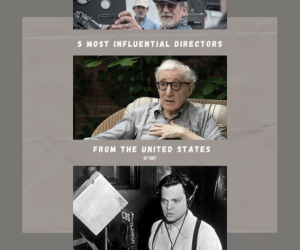More often than not, it’s quite easy to attribute one or two defining characteristics to the projects of a director – they appear as recurring themes and frameworks throughout much of what they direct. Woody Allen has provided us with a wonderful (and seemingly endless) stream of lighthearted romantic comedies, David Cronenberg is widely recognised as a full-fledged ‘master of darkness’, Quentin Tarantino generally lives for masterfully crafted revenge flicks and heist movies, Yorgos Lanthimos (who I can already happily announce as the subject of our next such article) likes delving into totalitarian societies or artificially-engineered micro climates, while Michael Bay, uhm, he likes explosions. The bigger, the better, and as many as possible. I look forward to predict that one day, his next movie project will simply be a sequence of explosions. Anyways, where there are rules, there are exceptions, and David Lynch’s portrait should undoubtedly sit by the syntagm ‘exception to the rule’, as featured in the Oxford Illustrated Dictionary.
“Damn good coffee!”
Despite still not having worked on a feature film since 2006, Lynch can take pride in his extremely vast filmography – not vast in the sense of the number of items on a list, but vast in theme and style. And, allow me this one manifestation of fanboy-ism: vast as in number of absolutely delicious masterpieces. He’s delved into everything, from sci-fi to neo-noir, action, psychological thriller, soap opera, romance, absurdist comedy, heartfelt family drama – you name it, he’s done it. Yet, he’s never won an Oscar, he’s never released a real box-office hit, and his name is not exactly recognisable outside the niche which worships him. His most noticeable marketing efforts of the past years include teaching people about transcendental meditation and a short video where he’s passionately criticising those foolhardy individuals who think that they’ve ‘seen a film on their fu***ng telephone’. Naturally, then, the best piece of news of the current decade was the confirmation of a Twin Peaks revival, due to air in 2017. Laura Palmer was right, we did end up seeing her again after 25 years! It was a rather long wait, to be fair, but then again, remember when Game of Thrones fans complained about having to wait 3 additional months before the current season would air? Well, 25 years is 300 months. Let that sink in for a minute.
“Something both strange and wonderful”
When the pilot episode of Twin Peaks aired in October 1990, many of those watching instantly understood that something special was unfolding before their very eyes. Jen Chaney from Vulture sums it up it all too well: ‘[Agent Cooper] is driving and speaking into his cassette recorder, telling the unseen Diane about the itinerary of his trip, the merits of cherry pie at the Lamplighter Inn, and the majesty of his Pacific Northwest surroundings. “I’ve got to find out what kind of trees these are,” he says, marvelling at how much beauty there is in the world while he speeds toward a hospital morgue to examine what lies beneath the fingernails of a murdered girl.’ The mixture of an elaborate whodunit mystery, lively and idiosyncratic characters, absurd humour, the hauntingly beautiful soundtrack penned by Angelo Badalamenti and Julee Cruise and, among others, a dwarf who dances and speaks backwards have made Twin Peaks a cult classic. But, if you got this far, you probably already know everything by heart, so let’s skip right to talking about Twin Peaks The Return.
“What the hell?”
Season 3, right from the first episode, feels like a sum of everything that Lynch has learned throughout the ages. But this is also due to the absolute liberty which Lynch was granted by Showtime, a freedom he did not have while producing the first two seasons. An immediate life lesson would be this: at all times, let David Lynch do what David Lynch wants to do. You’ll play your part in making the world a better place, trust me. There should be no shackles placed on creativity. The fact that people who have given a 10/10 rating to every Transformers film ever made criticise your series for being weird and stupid should be an encouragement rather than a deterrent. Especially if your name is David Lynch, and your new show is subsequently quoted as “reinventing television”.
Let’s talk a wee bit about some recurring elements of the Lynchian style, and pinpoint exactly where they come from – minor spoilers to follow. Episodes one and two borrow heavily from Eraserhead – the colour palette, the cold, industrial, enclosed environment and the sound design, naturally. His trademark constant background low hum quickly creates an uncomfortable feeling, which somehow beats the visuals in terms of creepiness, and that’s quite an achievement to start with. The almost Kafka-esque depictions of social isolation in Eraserhead, metaphorically showcased through the protagonist, Henry Spencer (played by Jack Nance), but also through characters suggestively named ‘Man in the Planet’ and ‘Woman in the Radiator’, somehow manifest themselves in The Return as well – think of the cosmic setting on display in the intro of one of the new episodes, the one featuring a woman with sown eyelids, who bears a striking resemblance to Ronette Pulaski. The image of a severed head casually floating through space? You’ve got it here, once again.
And as we’re already talking about isolation, let’s turn to Mulholland Drive – the 2001 film which also stars Naomi Watts and is arguably my favourite movie of all time. If you’ve seen that and episode 8, you’ll know exactly how awe-struck I was when I recognised one small element from the land beyond the Purple Ocean, which was also present in the Club Silencio scenes in the aforementioned film: the exact same stage. While no specific conceptualisation of divinity is presented in any of Lynch’s films, the Giant, as well as his lady companion in Mulholland Drive, oversee everything from an outside position, and are prepared to act whenever they deem it necessary. All in all, you know that Lynch is a genius when a quote from a film he made 16 years ago is so evocative once placed into the new context once the parallels are drawn: ‘There is no band, and yet, we hear a band’.
“I am 100% sure that we’re not completely sure”
David Lynch always liked exploring the root cause of a reality, or at least indicating it. We see the entrenched absurdness of top executives as it is treated with a hefty dose of irony in Mulholland Drive, and we observe the effects of a decadent society in Eraserhead. However, this is also symbolically hinted at in Blue Velvet – the film opens by showcasing the act of demolition of a suburban home, which looks perfectly neat on the outside, but has countless beetles emerging from its foundation. Episode 8 somehow mirrors this, but on a much larger scale – it explains the sins of mankind through another symbolic act of destruction, which later evolves into a dual act of birth, as a means of counterbalance and universal equilibrium. While some might look at this as a cheesy good versus evil interpretation, I would rather observe this through the prism of the intricate concept of yin and yang, especially since Eastern philosophy was heavily alluded at through Diane’s introduction just prior to these events.
I prefer not to talk about Dune, and Wild at Heart‘s contribution is rather readily apparent with regard to inter-character relationships. Then, we’ve got about three more Lynchian productions to talk about. The Straight Story is the unconventional film in Lynch’s unconventional filmmaking career, particularly because it’s so non-unconventional. There’s no trick in the title, this really is a simple, straightforward and magnificently beautiful movie which never fails to bring a tear to my eye. Glimpses of the pure emotion which characterise its entire plot can also be admired in the new Twin Peaks – the look in James’ eyes when he sees Shelly at the end of episode two (accompanied by a beautiful and thoroughly fitting song performed live by The Chromatics), Bobby’s reaction when he inadvertently glances towards Laura’s portrait or, even more relevantly, Carl Rodd’s relaxed gaze towards the sky, mere moments before a boy is run over by Richard Horne’s speeding car a stone’s throw away, are all moments of sublime beauty: short, simple, and yet so deeply expressive.
So finally, let’s link our beloved series to Lost Highway and Inland Empire. The BOB side of Twin Peaks‘ story seems to have crafted one of the major plot twists in Lost Highway, and basically developed the Mystery Man – one of Lynch’s best-written characters, despite his very brief cameo. Also, please consider the fact that Lynch uses quite a bit of Rammstein in Lost Highway – if you can spot the instance where a Rammstein song is subtly played in the new Twin Peaks, you’ll be mere moments away from making a haunting connection. Furthermore, even in all the absurdness of the unpolished diamond that Inland Empire ended up being, I can almost clearly see the concept of the Black Lodge as a parallel dimension, one where the line between real and imaginary is blurred, and the notion of time as we know it is more or less irrelevant.
“When you see me again, it won’t be me”
Not only has this particular line proven to be hilariously accurate, as Michael J Anderson’s role of The Man From Another Place has been given to a… talking tree, but it also gives me the opportunity to discuss two additional interesting elements. Twenty five years is quite a long time when placed within the context of the current pace of society’s transformation, and I was curious to see how Lynch would deal with this temporal gap. The first key element here is technology: Twin Peaks is what it is partly because of its late 80s, early 90s allure and essence. The transition to the modern era was therefore a big risk, which was fortunately handled quite expertly by the producers. The present setting strikes a great balance between the old and the new, combining the two rather hilariously: Lucy is clearly stuck in the past when it comes to the miracles of telecommunication nowadays, while both Sheriff Truman and Doctor Hayward showcase a flawless adaptation – the scene featuring the emerging computer in Frank’s office had me terribly amused. And envious!
And switching from technology to sociology, I’d like to briefly discuss the presence of Dennis/Denise Bryson, whose role was reprised by a David Duchovny after he started The X-Files, shot 9 seasons of it, took a 14-year break and subsequently returned for one more season. The decision to include a transgender character in a piece of early 90s media was an extremely brave move by David Lynch, one which, in retrospect, looks like a thoroughly inspired choice on the director’s part, since Denise was portrayed as a smart, capable and multi-dimensional character, rather than being the subject of comedy. Lynch recognised the importance of his previous inroads in social progressiveness and once again made quite a statement with a quote, incidentally coming from his own character, which I believe sums everything up: “When you became Denise, I told all of your colleagues, those clown comics, to fix their hearts or die.”
The viewing figures are not what they seem
The entertainment industry in the early 90s was quite different from the one we currently know and either hate or love to hate. I’m merely jesting, today’s universally-available streaming services are a wonderful and widely-accessible reality, but still, their ubiquitous nature have taken away much of the magic and mysterious unknowns surrounding television in general. As a parenthesis, the song by Nine Inch Nails featured in episode 8, ‘She’s Gone Away’ might well be about Laura Palmer, but it also seems terribly fitting within this context of the dissipation of this charm, doesn’t it? Anyways, back then, people would do their utmost to be in front of their TVs when the new Twin Peaks episode would air, or else they would miss important details, and their life would be completely and irrevocably ruined. They would then have to be content with rumours from friends, classmates or colleagues – nobody could be like ‘Oh, let me start a fact-checking Googling spree that will quickly set things right’. No, if you fu**ed up, you fu**ed up, no two ways about it. Thus, the show felt so much more as a part of their life than shows generally do today. The entire watching process took effort, patience and relentless commitment, unlike today’s Netflix binge-watching campaigns. What a disgrace of a society we live in, eh?
When Twin Peaks first aired, the pilot was watched by 34.6 million viewers in the US alone. The figure was almost halved for the first episode of the second season (19.1 million), and it seemed to then find itself in an inverse-proportional relationship with the amount of strangeness on display. When Laura Palmer’s killer was finally revealed midway through, figures plummeted to little over 10 million. Those were really bad figures back then, and the dwindling interest led to the show’s cancellation in 1991. I would have fought bravely to prevent this tragedy from occurring, but sadly I hadn’t even been conceived yet. So flash-forward 25 years plus a few months, and we finally have season 3. What’s the viewership figure this time around? Is it 649 million? Maybe I’m exaggerating, but still, it surely is above 50 million, isn’t it? Nope. The much awaited return gathered 0.506 million US viewers. Upon hearing this, I firmly declared that the end was nigh. When I learned that a random episode of the deeply philosophical Keeping Up With the Kardashians attracted a significantly larger viewership, I was ready to give up on society. Then it all clicked.
Twin Peaks has always been a niche production, and it is so now more than ever. We, the faithful few who will find ourselves on the edge of our seats while watching a Lynchian scene featuring a man who sweeps the floor continuously for 10 minutes, should be grateful that Lynch has decided to push the boundaries of television and practically spoiled us in any way imaginable in a time where television has very little to offer – Noah Hawley, Bryan Fuller and Nic Pizzolatto, thank you for existing and keeping hope alive. In 2017, it’s only natural that a show centred upon an unintelligent, talentless and uninteresting, empty personality Kim Kardashian will attract more attention than a product which requires you to use your brain cells and your imagination every other second. Plus, the picture is not so bleak: people stream their entertainment nowadays, as opposed to watching it when it comes on the telly, so with all the streaming figures added up, The Return‘s viewership is not THAT small.
Lynch’s dharma is unconventional filmmaking
I’m quite aware that I’ve been rambling for an excessive amount of time and space already, and while I would have a million other things to say about David Lynch and his Twin Peaks revival (all accompanied by adjectives such as ‘amazing’, ‘extraordinary’ or ‘unbelievable’), I will draw the line and conclude quite straightforwardly. In order to make your existence on Earth a resounding success, the most obvious step which you can take is watching everything that David Lynch has written, produced and directed. That’s all, hokay?

















zoritoler imol
Just wanted to tell you keep up the excellent job!